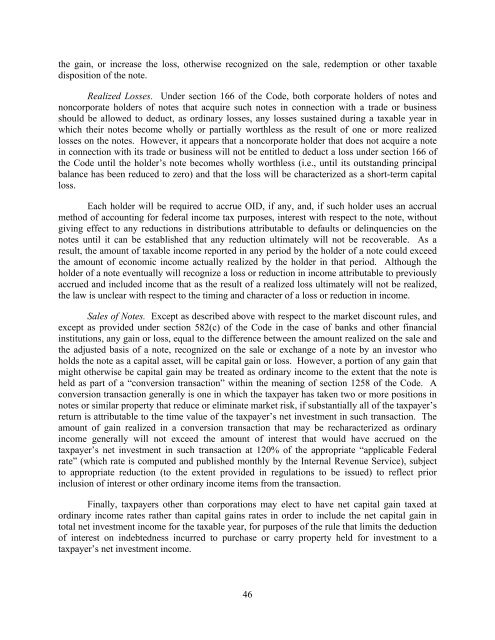LISTING SUPPLEMENT $189000000 Class A-1 Notes $342100000 ...
LISTING SUPPLEMENT $189000000 Class A-1 Notes $342100000 ...
LISTING SUPPLEMENT $189000000 Class A-1 Notes $342100000 ...
Create successful ePaper yourself
Turn your PDF publications into a flip-book with our unique Google optimized e-Paper software.
the gain, or increase the loss, otherwise recognized on the sale, redemption or other taxable<br />
disposition of the note.<br />
Realized Losses. Under section 166 of the Code, both corporate holders of notes and<br />
noncorporate holders of notes that acquire such notes in connection with a trade or business<br />
should be allowed to deduct, as ordinary losses, any losses sustained during a taxable year in<br />
which their notes become wholly or partially worthless as the result of one or more realized<br />
losses on the notes. However, it appears that a noncorporate holder that does not acquire a note<br />
in connection with its trade or business will not be entitled to deduct a loss under section 166 of<br />
the Code until the holder’s note becomes wholly worthless (i.e., until its outstanding principal<br />
balance has been reduced to zero) and that the loss will be characterized as a short-term capital<br />
loss.<br />
Each holder will be required to accrue OID, if any, and, if such holder uses an accrual<br />
method of accounting for federal income tax purposes, interest with respect to the note, without<br />
giving effect to any reductions in distributions attributable to defaults or delinquencies on the<br />
notes until it can be established that any reduction ultimately will not be recoverable. As a<br />
result, the amount of taxable income reported in any period by the holder of a note could exceed<br />
the amount of economic income actually realized by the holder in that period. Although the<br />
holder of a note eventually will recognize a loss or reduction in income attributable to previously<br />
accrued and included income that as the result of a realized loss ultimately will not be realized,<br />
the law is unclear with respect to the timing and character of a loss or reduction in income.<br />
Sales of <strong>Notes</strong>. Except as described above with respect to the market discount rules, and<br />
except as provided under section 582(c) of the Code in the case of banks and other financial<br />
institutions, any gain or loss, equal to the difference between the amount realized on the sale and<br />
the adjusted basis of a note, recognized on the sale or exchange of a note by an investor who<br />
holds the note as a capital asset, will be capital gain or loss. However, a portion of any gain that<br />
might otherwise be capital gain may be treated as ordinary income to the extent that the note is<br />
held as part of a “conversion transaction” within the meaning of section 1258 of the Code. A<br />
conversion transaction generally is one in which the taxpayer has taken two or more positions in<br />
notes or similar property that reduce or eliminate market risk, if substantially all of the taxpayer’s<br />
return is attributable to the time value of the taxpayer’s net investment in such transaction. The<br />
amount of gain realized in a conversion transaction that may be recharacterized as ordinary<br />
income generally will not exceed the amount of interest that would have accrued on the<br />
taxpayer’s net investment in such transaction at 120% of the appropriate “applicable Federal<br />
rate” (which rate is computed and published monthly by the Internal Revenue Service), subject<br />
to appropriate reduction (to the extent provided in regulations to be issued) to reflect prior<br />
inclusion of interest or other ordinary income items from the transaction.<br />
Finally, taxpayers other than corporations may elect to have net capital gain taxed at<br />
ordinary income rates rather than capital gains rates in order to include the net capital gain in<br />
total net investment income for the taxable year, for purposes of the rule that limits the deduction<br />
of interest on indebtedness incurred to purchase or carry property held for investment to a<br />
taxpayer’s net investment income.<br />
46
















